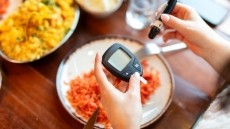B&D to market super-broccoli extract
with CS Agra to market sgs-100, a broccoli seed extract from a
plant strain that is unusually high in sulforaphane glucisinolate
(SGS), in the United States.
An antioxidant thought to have anti-cancer and heart health benefits, SGS occurs naturally in cruciferous vegetables like broccoli, Brussels sprouts and kale.
Following the discovery of sulforaphane at John Hopkins in 1992, proprietary new broccoli strains rich in glucoraphanin and its metabolite sulforaphane were developed by licensee Brassica Protection Products.
But until this year, the strains were only available as concentrated forms of broccoli sprouts in the US, Japan and New Zealand. Brassica's three-day-old broccoli plants are said to provide 20 times the concentration of SGS as found in adult broccoli.
The seed extract for use in dietary supplements (tablets, capsules or soft gels), functional and conventional foods and personal care products is marketed through CS Agra, a division of Caudill Seed Co.
B&D VP of sales Michael Sodaro told NutraIngredients-USA.com that, since there are so many different varieties out there, it is difficult to give a direct comparison between the SGS from CS Agra's broccoli and normal broccoli. He did say, however, that the SGS concentration is "very high", and that several pounds of broccoli would be needed to deliver the same quantity of SGS.
"This raw material embodies the perfect mix of natural whole food origin, antioxidant science, production technology and intellectual property," said Sodaro.
The '100' in the product name refers to 100 micromolars per unit of SGS.
The benefit of the extract is that it allows formulators to use less, resulting in a smaller finished dose size.
The studies that have been carried out into the anti-cancer effects of SGS all used 30mg of SGS, so it is important to ensure that this is the dose contained in finished products.
The most recent study into the effects of SGS indicates that it may help reduce cholesterol levels in a matter of days.
Carried out at the Tokyo University of Agriculture and The Japan Institute for the Control of Aging and presented at Natural Products Expo West in March, it indicated that individuals who ate 3 1/2 ounces of broccoli sprouts every day for a week reduced their overall cholesterol level and increased levels of HDL or 'good' cholesterol.
"This study is significant because it underscores the powerful preventive role that we think sulforaphane plays in assisting the body to help fend off a variety of diseases," said Dr Jed Fahey, Johns Hopkins School of Medicine. "There are human studies underway across the globe that are examining the diverse disease-fighting potential of this compound."













